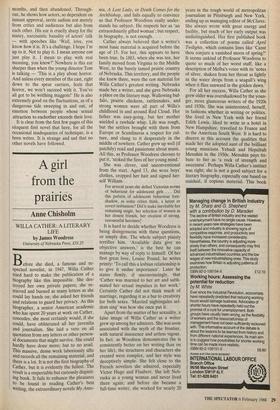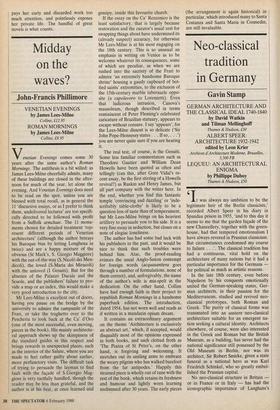A girl from the prairies
Anne Chisholm
WILLA CATHER: A LITERARY LIFE by James Woodress
University of Nebraska Press, £33.25
Before she died, a famous and re- spected novelist, in 1947, Willa Cather tried hard to make the publication of a biography like this impossible. She des- troyed her own private papers; she re- trieved and burned as many letters as she could lay hands on; she asked her friends and relations to guard her privacy. As this biographer, a senior American academic who has spent 20 years at work on Cather, concedes, she most certainly would, if she could, have obliterated all her juvenilia and journalism. She laid a veto on all quotation from any letters or other person- al documents that might survive. She could hardly have done more; but to no avail. This massive, dense work laboriously sifts and records all the remaining material, and there is a lot. It is not the first biography of Cather, but it is evidently the fullest. The result is a respectable but curiously dispirit- ing book. It fails to enhance the pleasures to be found in reading Cather's best writing, the extraordinary novels My Anto- nia, A Lost Lady, or Death Comes for the Archbishop, and fails equally to convince us that Professor Woodress really under- stands his subject. He respects her as 'an extraordinarily gifted woman'; but respect, in biography, is not enough.
Cather always believed that a writer's most basic material is acquired before the age of 15. For her, this appears to have been true. In 1883, when she was ten, her family moved from Virginia to the Middle West, to the barely tamed prairie country of Nebraska. This territory, and the people she knew there, were the raw material for Willa Cather's greatest writing. Nebraska made her a writer, and she gave Nebraska a place on the literary map. Wallowing buf- falo, prairie chickens, rattlesnakes, and strong women were all part of Willa's childhood in and around Red Cloud. Her father was easy-going, but her mother wielded a rawhide whip. Life was rough, but the settlers brought with them from Europe or Scandinavia a respect for cul- ture, and clung to it desperately in the middle of nowhere. Cather grew up well (if patchily) read and passionate about music. All this, as Professor Woodress chooses to put it, 'stoked the fires of her young mind.'
She was clever, and unconventional from the start. Aged 13, she wore boys' clothes, cropped her hair and signed her- self William.
For several years she defied Victorian norms of behaviour for adolescent girls . . . Did this pattern of adolescent behaviour fore: shadow, as some critics think, a latent or covert lesbianism? Did it make inevitable her remaining single, her selection of women as her closest friends, her creation of strong, resourceful heroines?
It is hard to decide whether Woodress is being disingenuous with these questions, or simply dim. The whole subject plainly terrifies him. 'Available data give no objective answers,' is the best he can manage by way of reply to himself. Of her first great love, Louise Pound, he writes primly: 'To call this a lesbian relationship is to give it undue importance'. Later he states firmly, if unconvincingly, that `Cather was married to her art and subli- mated her sexual impulses in her work.' Certainly Cather did not think much of marriage, regarding it as a bar to creativity for both sexes. 'Married nightingales sel- dom sing' was how she once put it.
Apart from the matter of her sexuality, a false image of Willa Cather as a writer grew up among her admirers. She was soon associated with the myth of the frontier, with natural innocence and artless vigour.
In fact, as Woodress demonstrates (he is consistently better on her writing than on her life), the structures and characters she created were complex, and her style was deceptively simple. She felt close to the French novelists she admired, especially Victor Hugo and Flaubert. She left Neb- raska as a young woman and never lived there again; and before she became a full-time writer, she worked for nearly 20 years in the tough world of metropolitan journalism in Pittsburgh and New York, ending up as managing editor of McClures. She always wrote with great energy and facility, but much of her early output was undistinguished. Her first published book was a collection of poems called April Twilights, which contains lines like 'Canst thou conjure a vanished moon of spring?' It seems unkind of Professor Woodress to quote so much of her worst stuff, like a description of Melba's voice with its 'notes of silver, shaken from her throat as lightly as the water drops from a seagull's wing when it flies sunward in the golden dawn.'
For all her success, Willa Cather as she grew older was overshadowed by the youn- ger, more glamorous writers of the 1920s and 1930s. She was uninterested, herself, in fashions whether in writing or politics. She lived in New York with her friend Edith Lewis, liked to write in a hotel in New Hampshire, travelled to France and to the American South West. It is hard to discern in this account the qualities that made her the adopted aunt of the brilliant young musicians Yehudi and Hepzibah Menuhin in the 1930s. Menuhin pays tri- bute to her as 'a rock of strength and sweetness'. Perhaps Willa Cather's instinct was right; she is not a good subject for a literary biography, especially one based on residual, if copious material. This book pays her early and discarded work too much attention, and pointlessly exposes her private life. The handful of great novels is what counts.



















































 Previous page
Previous page